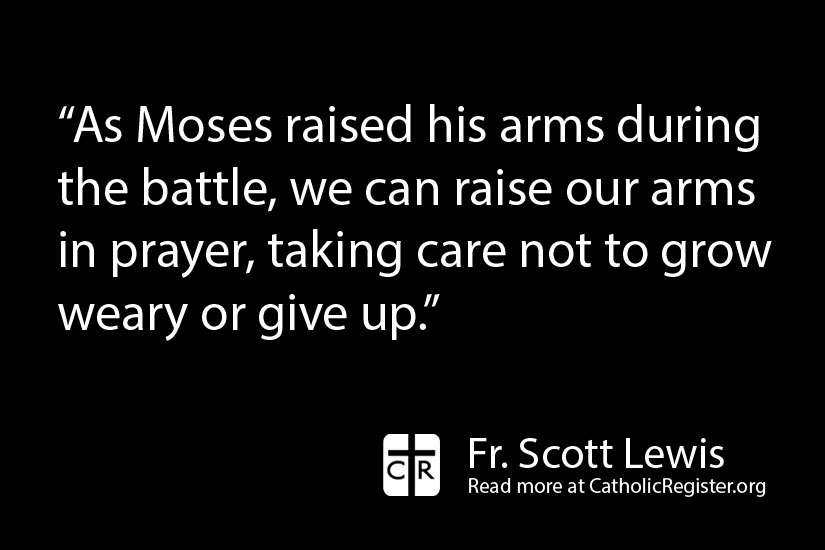29th Sunday in Ordinary Time (Year C) Oct. 16 (Exodus 17:8-13; Psalm 121; 2 Timothy 3:14-4:2; Luke 18:1-8)
Good leadership is essential in all human endeavours, whether in war, business or politics. The qualities of a leader can make or break any battle or collective activity. During the battle with the Amalekites, Moses stood on a hill with his lieutenants where he could be easily seen by his troops. His raised arms gave them courage — in their own minds, he was imparting some sort of blessing or power. They felt reassured that God was with them. As long as his arms remained raised, the Israelites prevailed; when Moses’ arms drooped, they began to lose ground.
From paranoia to 'metanoia'
By Fr. Ron RolheiserSometimes we’re a mystery to ourselves, or, perhaps more accurately, sometimes we don’t realize how much paranoia we carry within ourselves. A lot of things tend to ruin our day.
Gratitude unlocks gates to mercy
By Fr. Scott Lewis, S.J28th Sunday in Ordinary Time (Year C) Oct. 9 (2 Kings 5:14-17; Psalm 98; 2 Timothy 2:8-13; Luke 17:11-19)
It is often said that we imagine God in our own image and likeness. We think that God shares our likes and dislikes, hatreds and loves, opinions and way of looking at the world. God might even belong to our favourite political party or social class. Throughout the two biblical testaments, God repeatedly demonstrates that this is just not so. God shocks people by violating their opinions and prejudices, and by doing what is unexpected and distressing.
Feeding off of life’s sacred fire
By Fr. Ron RolheiserSee the wise and wicked ones who feed upon life’s sacred fire
These are lines from Gordon Lightfoot’s song “Don Quixote,” and they highlight an important truth: both the wise and the wicked feed off the same energy. And it’s good energy, sacred energy, divine energy, irrespective of its use. The greedy and the violent feed off the same energy as do the wise and the saints. There’s one source of energy and, even though it can be irresponsibly, selfishly and horrifically misused, it remains always God’s energy.
The righteous person lives by faith
By Fr. Scott Lewis, S.J27th Sunday in Ordinary Time (Year C) Oct. 2 (Habakkuk 1:2-3; 2:2-4; Psalm 95; 2 Timothy 1:6-8, 13-14; Luke 17:5-10)
Habakkuk could have been written yesterday — in fact, it could have been written at almost any point in history. It describes events and situations that humans have always faced: violence, destruction, fear and injustice. We are not sure when the prophet Habakkuk lived and exercised his ministry. The best estimates are the very late seventh century B.C., possibly during the reign of Josiah the King.
Exuberance will come after the cross
By Fr. Ron RolheiserIt’s funny where you can learn a lesson and catch a glimpse of the divine. Recently, in a grocery store, I witnessed this incident:
A young girl, probably around 16 years of age, along with two other girls her own age, came into the store. She picked up a grocery basket and began to walk down the aisle, not knowing that a second basket was stuck onto the one she was carrying. At a point the inevitable happened, the basket stuck to hers released
We are always our brother’s keeper
By Fr. Scott Lewis, S.J26th Sunday in Ordinary Time (Year C) Sept. 25 (Amos 6:1a, 4-7; Psalm 146; 1 Timothy 6:11-16; Luke 16:19-31)
The absence of love is indifference, and it is indifference that will bring our world low if we are not more heedful of divine law.
Ups, downs and happy death
By Fr. Ron RolheiserIn the Roman Catholic culture within which I grew up, we were taught to pray for a happy death. For many Catholics at the time, this was a standard petition within their daily prayer: “I pray for a happy death.”
Today’s actions have eternal consequences
By Fr. Scott Lewis, S.J25th Sunday in Ordinary Time (Year C) Sept. 18 (Amos 8:4-7; Psalm 113; 1 Timothy 2:1-7; Luke 16:1-13)
Exploitation, injustice and corruption are as familiar as the sunrise and sunset. There are many similarities between eighth century B.C. Israel — the time of the prophet Amos — and our own world. Amos pulled no punches in his public utterances against the establishment. Looming over them was the threat of the violent and rapacious Assyrian Empire. Amos sought to call Israel back to the path of justice and righteousness — in other words, the way of God — before it was too late. Interestingly, he did not touch on what we might call “religious” practices, such as ritual, liturgy and sacrifice. Instead, he described familiar patterns of human behaviour: dishonest business dealings, as well as brutal and greedy tactics that crushed people and enslaved the poor.
Trust in God requires a dose of fear
By Fr. Ron RolheiserUnless you are already a full saint or a mystic, you will always live in some fear of death and the afterlife. That’s simply part of being human. But we can, and must, move beyond our fear of God.
God in His mercy writes no one off
By Fr. Scott Lewis, S.J24th Sunday in Ordinary Time (Year C) Sept. 11 (Exodus 32:7-11, 13-14; Psalm 51; 1 Timothy 1:12-17; Luke 15:1-32)
Fickleness and ingratitude are unfortunate human characteristics that have always been with us. God had done so much for the Israelites. He had liberated them from Egypt with mighty signs and wonders, as well as providing them with food and water in the hostile wilderness. But they asked the age-old question: what have you done for me lately?












